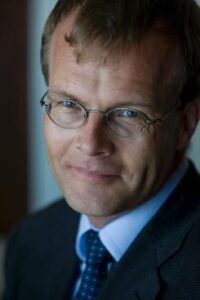
“Learning at IMD is like an upgraded Google street 
With a dream CV that combines medical training, molecular biology research, investment banking, capital raising and brokerage, Zilian joined IMD programs at key moments in his career. And it was during his IMD Executive Master of Business Administration in 2014 that he laid the groundwork to create his next job: in January 2016, he became Senior Vice-president Corporate Development of Medigene AG, a publicly listed biotechnology company specialized in T cell-focused immunotherapy platforms.
Trained physician moving into natural sciences
Zilian grew up in Basel, the son of a German chemist and chose to go into medicine rather than research, because “it gives a broader training and range of activities”. Once a qualified MD, however, he found that too much time was spent filling out forms: “If a hospital was excavated in future times, they would discover a paper shop!” He continued his studies in molecular biology, earning his PhD in 1995.
Combining sciences with the business world
Zilian then moved to San Francisco as a Postdoctoral Research Fellow in the Department of Molecular Oncology at Genentech Inc., which he qualified as a fantastic experience at the crossroads of medicine and the business world.
Upon his return to Switzerland in 1997, he moved back to fundamental research with the Swiss Institute for Experimental Cancer Research (ISREC), in affiliation with a start-up company. He wanted to be closer to the decision-making processes and contribute to research that directly benefits patients. With only a few people from very diverse backgrounds, the maximum had to be achieved: “I discovered that competitive advantage is not restricted to market benefits, but applies to research as well.”
Combining science, business and finance
After the 2000 dotcom bubble contributed to the demise of the startup, Zilian joined Helvea SA, formerly Pictet in 2005, where he could contribute his industry expertise to the investment community as a Senior Analyst on sell-side research for European healthcare companies. By sticking to the fundamentals of data analysis, he says that he was able to keep an independent viewpoint and not bow to the psychological pressure of some of the big players. “You’re a lonely fighter on the field, but you learn to beat the market.”
FIRST IMD EXPERIENCE
Five years later, Zilian was ready for a new challenge and turned to an open enrolment program at IMD. He says it helped him better understand the world of general management and was the perfect springboard to the EMBA.
Creating your own job
His knowledge of the health care sector continued to stand him in good stead when Helvea was acquired in 2013 by Baader Bank and it also set him on course for his next career move and employment. After acquiring the startup Trianta, Medigene turned to Zilian to lead a first capital raise of EUR 16m. Upon successful completion, Zilian realized: “They need me. I will raise further money and finance my new job.” He led a second capital measure the following year, this time raising EUR 46m. By then, he had definitely proven that he had strong relations with investors since he was able to position a proprietary technology platform still unproven on humans.
IMD EMBA
As part of the engagement process, Zilian obtained that Medigene sponsor his EMBA. In order to propose the reorganization of a company that had been accumulating losses over 20 years, and prepare it better for its merger with Trianta, Zilian says that the IMD helped him adopt “a very structured process in terms of entrepreneurial thinking. You take out the complexity by boiling things down to the basics, then by restructuring them and defining a new strategy.”
Furthermore, he needed bottom-up training to create his new job and prepare himself for the new responsibilities. Although he found the program to be geared to larger, well-established companies that generate cash flows and can take on loans, he found the financial training to be particularly helpful. When he told Finance Professor Nuno Fernandes that he was coming from a tiny company without regular revenues and where cash can only be raised through equity, Fernandes reassured him: “If it’s real world, it’s real learning.”
Zilian realized that he had to adjust his language to his fellow EMBA participants whose professional, cultural and geographical backgrounds were so different: “I had to ask myself, would they buy in?” Considering the need for smaller companies to prepare themselves for global futures, he found this to be very useful: “By understanding what drives those economies, new opportunities are created.”
Although he knew that he was letting himself in for a tough year, he admits that he underestimated the workload, but managed to keep some time for the family. One of the key learnings from the leadership modules, he says, is the importance of striking the right work/life balance. The self-reflective mode, he insists, using the Google car metaphor, allows him to be prepared “and know where the issues are ahead of time”.



